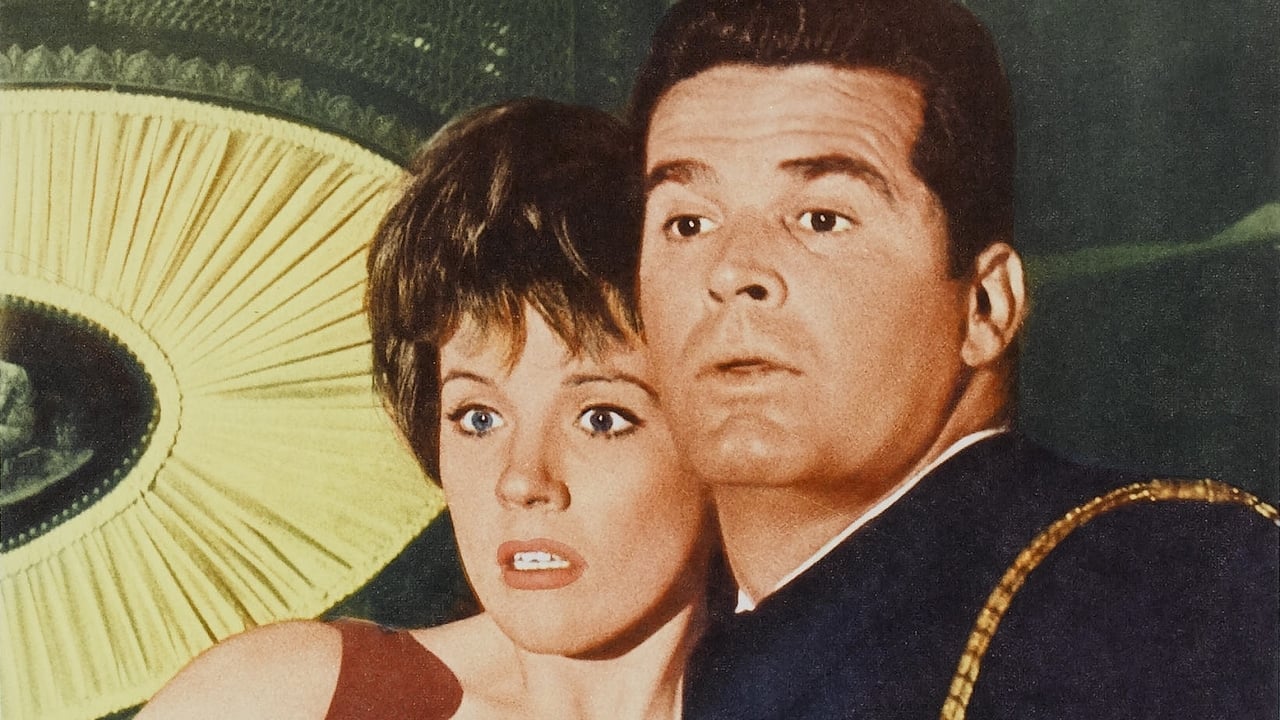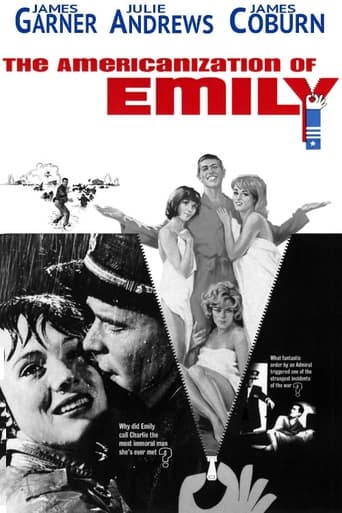



Although it has its amusing moments, in eneral the plot does not convince.
View MoreThis is a tender, generous movie that likes its characters and presents them as real people, full of flaws and strengths.
View Moreit is the rare 'crazy' movie that actually has something to say.
View MoreI have absolutely never seen anything like this movie before. You have to see this movie.
View MoreNot the typical American romantic comedy in the WWII, here are dense and sharp dialogue, with sarcastic characters ridiculing the noble art of war and argue in favor of cowardice as a form of pacifism (something really curious) and that makes the difference with others films of the same kind and gives that movie a special value, especially in the first half... but, unfortunately... as the footage progresses it begins to drift, get lost, becomes chaotic in the worst sense (kind a screwball comedy) and repeated ad nausea, with characters talking and screaming nonstop, to say the same thing over and over again, until the very last minute, for nearly two hours, making an unnecessarily long and heavy movie. A missed opportunity to do a really ironic and brilliant film.
View MoreIn a modern world filled with films featuring actors pretending to be intelligent people saying simpleton lines of seven words or less, what a joy it is to see a film with intelligent people (played by great actors) saying intelligent, complex sentences (written by a great screenwriter).And what acting! I have always respected James Garner and Julie Andrews, but here they shine, as though they have embodied the very essence of their characters and projected it onto the screen. This is a love story set in wartime. It is the cultural differences and conflicts in values between the American and British leads that makes it interesting. The evolution of these characters drives the story. Despite their differences and initial dislike for one another, they fall in love. Yet, in spite of the seeming implausibility of the relationship, Andrews and Garner make it believable, without being saccharine or simplistic. None of the secondary roles come across as stereotyped or caricatures, a credit to Paddy Chayefsky's script, Arthur Hiller's direction, and fine acting. Well, almost none. Steve Franken does a fine drunk, a role he would reprise four years later in The Party, and Keenan Wynn adds to the well-placed (and plausible) comic relief during the invasion.We encounter the central essence of the film early on in Garner's scorching little speech: "We crass Americans didn't introduce war into your little island. This war, Ms. Barham, to which we Americans are so insensitive, is the result of 2,000 years of European greed, barbarism, superstition, and stupidity. Don't blame it on our Coca-Cola bottles. Europe was a going brothel long before we came to town." Far from being a "Sixties movie," those words still ring true today, as they would have in 1944. Yet, somehow, the British have turned gratitude for saving their butt to resentment. This movie provides the long lost clue, the grudge that Brits dare not speak of openly: The Americans were seducing their women with stockings and chocolate bars, while they were away at war. Some of the more beautiful even, gasp!, moved to America with them.The novel confronts this more directly, and makes this the meaning of "Americanization" of women, while the movie makes Americanization a more abstract change in values of Emily and her mother - a shift from patriotism to cynicism, to oversimplify it. And even that would engender resentment from the British today. Though this movie was released in 1964, it would not be entirely correct to call it a Sixties movie; it has more in common with Mr. Roberts - 1955, than more surrealistic antiwar works like MASH. Planning would have begun in 1963, probably before the death of JFK, and before the escalation of the Vietnam War with the Tonkin Gulf Resolution. So there was no antiwar movement when this film was made. That side of the Sixties was yet to come, and might never have, had JFK not been assassinated.This is not an antiwar movie, as the actors' lines make clear, but it is highly skeptical. It is about the anomie and louche values that can occur between the cracks of command during wartime. On the other hand, it followed Kubrick's Dr. Strangelove in 1964, also with a general anti-war theme, suggesting the American public was not in the mood to get into another war. No one actually said, Hey, let's go to war in Vietnam! President Johnson just backed us in.I'm glad this movie didn't adopt the more comic tone of Dr. Strangelove or MASH. I'm almost tempted to say it is not a comedy, except the opening scenes have a clear comic overtone. There are several layers to the movie, one being humorous - perhaps it could be describe as light black humor. The advantage of Hiller's style is it retains more realism. There are also shifts in that realism as we see Garner and Andrews in different situations, such as on a country pond, far from the war. Hiller does a fine job of presenting contrasting moods in wartime England. There is a strong feeling of ambiance, and fine presentation of the subtle interactions of the characters, thanks to the slower pace.So William Wyler was booted for tinkering with Chayefsky's script (why??). I love Wyler, but he was nearing the end of his career, while Hiller was a younger director with almost no movie experience, but tons of work on many fine American televisions series where he evidently honed his craft. The directing was fine, with one exception: The scenes of the actual landing of Garner at Normandy are hokey, though probably due to budget (and not having CGI, yet).They say this is the favorite movie of Garner and Andrews. Actors don't always like to watch their own movies. Andrews was not happy being stereotyped as Mary Poppins and Maria Von Trapp (with a script she viewed as "treacle"), though they are highly-respected works. Much of Garner's work was solid, though sometimes a bit light. My favorite is Support Your Local Sheriff, which I can't recommend too highly. But here we (and they) see acting with subtlety and depth in a setting that is not embarrassing for them to watch.Spoiler alert:Garner presumably marries Andrews in the end, an unhappy ending from the British perspective. I suspect that if you are British you will probably like this movie even less than the much despised U-571 (please see my review, headed: "Bangers and mash aren't fish and chips"). Yes, not all Brits hate Yanks.
View MorePaddy Chevesky wrote some pretty good scripts. Auther Hiller directs with James Garner & Julie Andrews carrying the load here very well. James Coburn supports a talented supporting cast.This film sets up Garner in a character he plays often, a coward who is being asked to be a hero on D-Day. He naturally thinks the project is nuts as they want him to be the first on Omaha Beach with a camera. He becomes involved with British woman Emily (Andrews) & tries to convert her into a woman who could love a coward, in spite of her own standards.Where this film really breaks ground is one scene where Emily & Garner argue & he proceeds to call her a b* tch. In the mid 1960's, this was a rare event in films. I am not sure if because of the writer / director this line got through, but it is a rare time in film for Andrews to be called a b* tch.Garner has a top notch performance in this & Andrews is strong in this one too. It does have the Hollywood happy ending.
View MoreThis classic anti-war film with its heavy dose of black humor is one of the most entertaining "war" movies I have ever seen. Not a war movie in the usual sense, it definitely deals with the subject of war and attempts, through the character of Charlie Madison, to expose war as a tragedy. The lesson is delivered with a dose of levity that makes this movie all the more entertaining.Writer Paddy Chayefsky has scripted material custom-made for James Garner and Julie Andrews in the roles of Lt. Cmdr. Charlie Madison and Emily Barham. The two leading actors are supported by a strong cast that includes Melvyn Douglas, James Coburn, Joyce Grenfell and William Winton.Garner is the cynical aide to Admiral Jessup, played by Melvyn Douglas. Jessup is dedicated to the glorification of war and particularly the role of the navy. Garner, as Madison, delivers a number of private lectures on the immorality of war and the men who wage it and confesses that he is a coward. The audience can judge whether or not he is a coward but he is honest and is certainly nobody's fool. He does not let his strong anti-war bias show but dutifully performs his job for the jaded Admiral Jessup. The role is made for Garner and he delivers.Madison meets and falls in love with a young Englishwoman, Emily Barham, who is the epitome of the stiff upper lip folks of wartime Britain. Emily has lost her husband, father and brother to the war but unlike Charlie, feels that their deaths are heroic. Charlie Madison, the self-confessed coward, and Emily literally come to blows during a stormy relationship. Nevertheless Charlie is a very witty and debonair "coward"...one who Emily cannot resist.The climax comes when Adm. Jessup in one of his moments of insanity, decides to film the first unknown sailor to die on the beaches of Normandy. James Coburn, who plays Charlie's womanizing buddy, embraces the scheme with enthusiasm. Charlie finds himself reluctantly going along with this public relations stunt with interesting consequences for his career and for his relationship with Emily.James Coburn, Melvyn Douglas, and Joyce Grenfell are all in top form. William Winton, who later starred in Murder She Wrote with Angela Lansbury, offers another strong supporting role. The movie is one great vehicle for the talents of Garner and Andrews, who meet up again in the movie Victor, Victoria, many years later. There is a remarkable chemistry between them.
View More